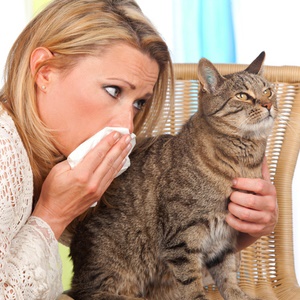
Allergies to domestic animals such as cats are extremely common. Symptoms like coughing, sneezing and itching can be unpleasant, but for some, not having pets is not an option.
Why are cat allergies so common?
According to the Asthma and Allergy Foundation of America, cat allergies are more common than dog allergies. The reason for this is a protein found in cat hair. Cat allergies are triggered by the overreaction of the immune system to a specific protein called FEL d1.
FEL d1 is a common allergen, mainly because of the size of the molecule. It is extremely lightweight and easily absorbed by the respiratory system and is found in cat dander, urine and saliva. The allergen spreads over large areas of the house as the cat grooms itself and sheds hair. The texture of the molecule is also sticky, making it hard to remove from carpets, furniture and other surfaces.
Symptoms from this allergen range from mild to more severe and can range from sneezing and coughing to more severe asthma symptoms.
Managing cat allergies
But what if you really want a cat? People who suffer from mild to moderate flare-ups can absolutely control their allergies by managing their environment and practising good hygiene. This is good news for people who would rather manage their symptoms than give up their beloved cat.
“However, if the situation is life-threatening and asthma symptoms are hard to control, it’s not recommended to live with a cat,” says Dr Robert Wood, division chief of paediatric allergy and immunology at Johns Hopkins Children's Center in Baltimore, US.
Keep your kitty
If you do suffer from mild allergies but long for a cat, here are some ways to control the environment.
1. Manage medication
Keep medication on hand to tackle the symptoms you experience regularly. Over-the-counter medication can help with mild symptoms such as sneezing and itchy eyes, but consult your doctor for medication to help treat more severe symptoms such as asthma. And if you are considering welcoming a feline friend in your home, talk to your doctor about regular medication to manage your symptoms.

2. Clean regularly
Vacuum regularly and consider getting rid of loose carpets if you have a tile floor. Dander sticks to surfaces, so it’s necessary always to keep surfaces as clean as possible. You can also invest in a HEPA filter to help filter the allergens out of the air. Also regularly wash walls, tiles and furnaces as dander sticks to these surfaces.

3. Keep cats out of your bedroom
It may be tempting to snuggle with your cats, but you can significantly reduce your allergies if you keep your linen dander-free. Consider investing in a mattress protector that reduces allergens, and change your bed linen regularly.

4. Wash your hands
This might seem like an obvious tip, but washing your hands frequently will help to avoid distributing dander onto your clothes.

5. Adapt your cat’s diet
You can speak to your veterinarian about adapting your cat's diet in order to produce less in the way of allergens. A general healthy, balanced diet will help your cat to shed less, limiting your exposure to dander.

Image credits: iStock




 Publications
Publications
 Partners
Partners















